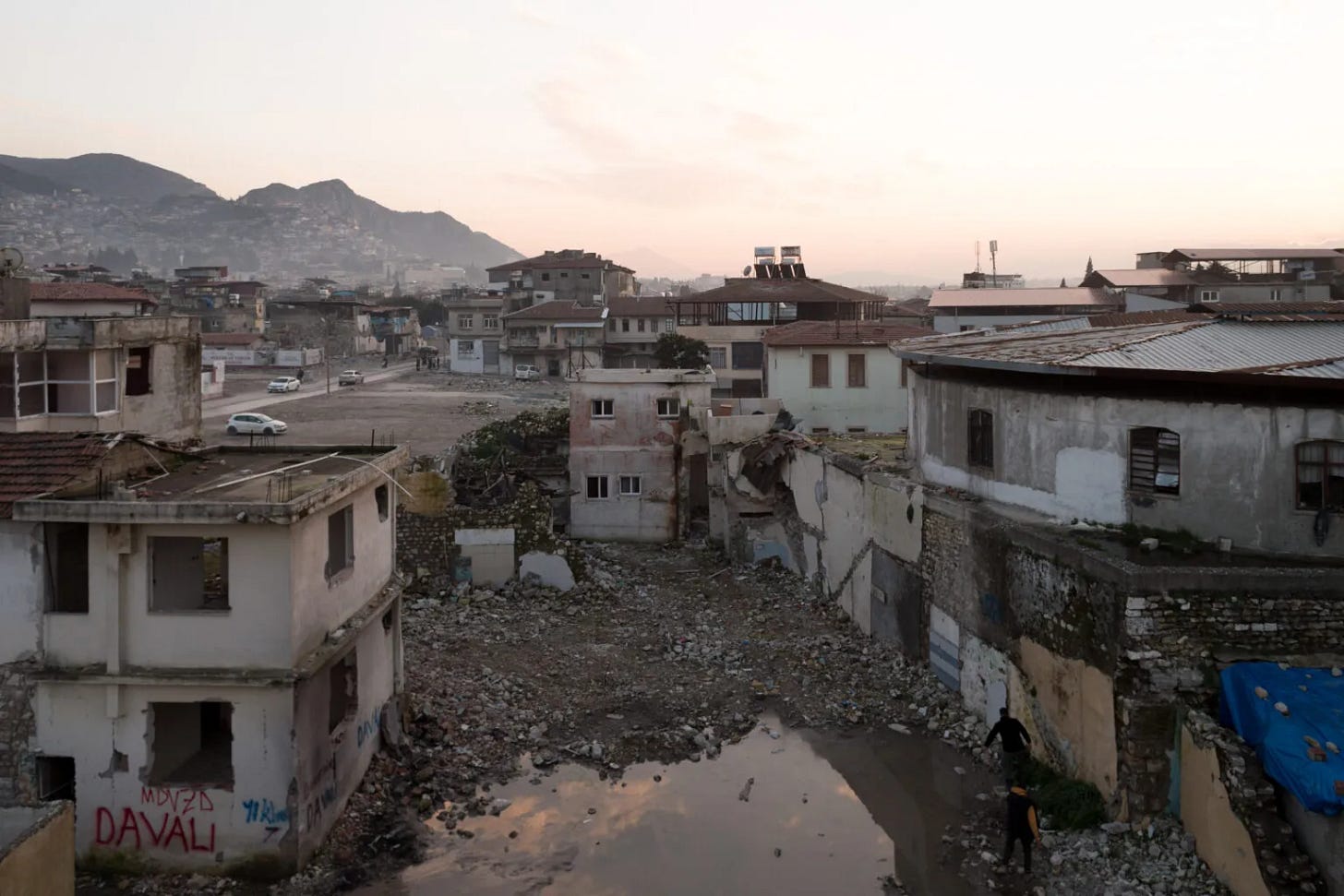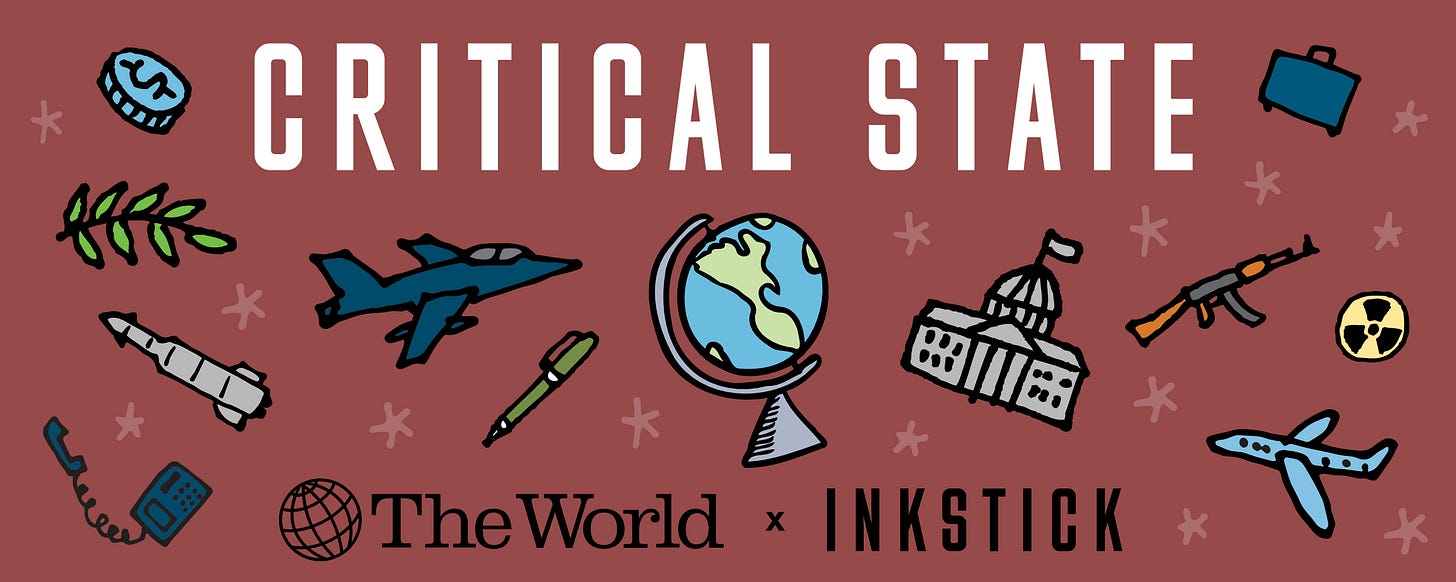Critical State: Mass Deportations? They’re Already Here
If you read one thing this week … read about the border industrial complex.
Immigration has dominated the headlines so far this year, and everyone knows why: Donald Trump, now in his second term, has vowed to carry out mass deportations. And because everything is a business in the United States, this new crackdown is already looking like it will be a lucrative one.
In a new piece jointly published at the Border Chronicle and TomDispatch, longtime border watcher Todd Miller dug deep into the roots of the border industrial complex, the way Democrats have helped build it, and what we can expect as the Trump administration escalates its crackdown.
Despite the widely held belief that Democrats opened the borders and allowed people from all over the world to freely come to the country, Miller argued, the Biden administration was “the biggest contractor (so far) for border and immigration enforcement in US history.”
Miller also broke down the numbers. In 2024, the border budget was $5 billion more than it was in 2020, the last year of Trump’s first term. “In reality, Donald Trump is inheriting the most fortified border in American history, increasingly run by private corporations,” Miller wrote, “and he’s about to use all the power at his disposal to make it more so.”
If You Read One More Thing: Europe’s External Borders
For the Greece-based investigative collective Solomon, Christian Jakob and Stavros Malichudis have published a deep dive into the European Union’s migration agreements with Egypt:
The EU and Egypt have maintained such agreements since as far back as 2007, the authors noted, but the 2015 spike in refugees and migrants reaching Europe led to deeper collaboration.
Since then, a slate of agreements between EU countries and Egypt have dumped massive amounts of money into the government of Abdel Fattah El-Sisi. Although the EU maintains similar agreements with other countries, the authors explained: “From 2024 to 2027, Egypt will receive more money than any other country in the past, under a migration agreement with the EU.”
Built That Way

At The Dial, Emily Wither takes a hard look at the ongoing fallout from the February 2023 earthquakes that devastated Turkey and Syria, killing tens of thousands:
Two years on, Turkish courts are “overwhelmed” with cases in which “families seek to hold accountable those responsible.”
“Several hundred building owners and contractors were arrested in the immediate aftermath of the earthquakes,” Wither wrote. “Some went into hiding, and at least one was caught at the airport trying to flee the country.”
With the legal system backlogged, survivors seeking justice are watching their cases move ahead at a funeral’s pace. “Often, insufficient evidence was collected before rubble was hastily cleared away in the aftermath of the earthquakes, making it hard to prove why the buildings crumbled so easily,” Wither noted.
Deep Dive: The German Kids Are Not Alright
With Elon Musk cheering on Germany’s far-right Alternative für Deutschland (AfD) and US Vice President JD Vance suggesting that the German government is politically repressing it, you’ve probably heard more in the news lately about that party than ever before.
The AfD came into existence in 2013, staking its position in its early years as one of the country’s leading Eurosceptic, anti-immigrant parties. Today, the AfD has 77 seats in Germany’s Bundestag, more than 280 in state parliaments, and 15 in the European Parliament.
But how did the AfD build such a broad base of support? According to a paper at the International Political Science Review, that happened, in part, thanks to successes of the party’s influential youth wing, the Junge Alternative (the JA, or Young Alternative).
Parties across Europe have youth wings, wrote Anna-Sophie Heinze, but studies focused on the far right often neglect the role of youth wings, even though they serve as “important drivers” in radicalization.
Heinze dug into the JA because the AfD is “one of the youngest successful radical right parties in Europe,” and although there has at times been an “ambivalent relationship” between the youth wing and the party, around seven out of every 10 JA members are also AfD members.
More specifically, Heinze looked at the way JA’s radicalization interacted with the radicalization of its “mother party.” To that end, she conducted interviews with JA members, analyzed the youth group’s social media output and literature, and examined official JA and AfD documents as well as those of intelligence services.
Over time, Heinze explained, the JA and the AfD became cozier, and by 2017, around 8.5% of AfD members in the Bundestag were also members of the JA. For its part, the AfD has walked a tightrope between taking harder right-wing stances and presenting in a way that could help it build a more robust appearance of legitimacy in the eyes of voters and other parties.
Yet, even as the JA became the party’s official youth wing and the AfD build a broader base of support, the youth wing has since 2020 moved toward more “open” extreme right positions.
“In the long term, organizational development and radicalization went hand in hand,” the author noted. “The JA even seemed to be a driver or at least reflector of the AfD’s radicalization.”
Because the JA has earned the designation of a “proven extremist” group in Germany, intelligence services have monitored many of its members in recent years. Likewise, the AfD itself has been under the watchful eye of the intelligence services for years.
Pointing to the AfD’s history of at times distancing itself from the youth wing, Heinze wrote that the party nonetheless never split from the JA. “Instead, both organizations increasingly tried to present themselves as the (only) ‘true opposition’ fighting against the corrupt elites and intelligence services,” she wrote.
The JA did not act alone in radicalizing its mother party, Heinze noted, but “youth wings are an important dimension of party organization for the far right.” She added, “Studying them can help to identify extremist tendencies at an early stage and develop political and civic counter measures.”
Show Us the Receipts
Although there is still a fragile ceasefire in place, Israel’s war in Lebanon devastated much of the country — and civilians were not spared. Hanna Davis traveled to some of the hardest-hit parts of the country to speak with the volunteer rescue workers who scrambled to save lives as airstrikes rained down. Such strikes killed at least 201 medics and wounded over 253, according to a report by Lebanon’s Health Ministry. That report also said that Israel had targeted 67 rescue centers, 177 ambulances, and 59 fire engines. “They were my friends,” one rescue worker told Davis of his slain colleagues. “They were like brothers.”
Meanwhile, the United States has recently carried out a series of strikes in Somalia. Although Donald Trump has claimed time and again that he opposes forever wars, Devra Baxter argued, his record on Somalia during his first term was especially dismal. In fact, Trump carried out three times more strikes on the African nation than Biden, Obama, and Bush combined. Past policies only intensified instability and led to increased intervention and a prolonged war,” Baxter wrote. “If Trump really wants to end wars and get us out of Somalia again, he needs to do it in a way that advances peace and resilience.”
Elsewhere, Ridwan Karim Dini-Osman has highlighted an especially alarming consequence of Trump’s decision to slash foreign aid. In Africa, that decision is wreaking havoc. “The move has raised alarm across Africa,” Dini-Osman wrote, “where millions depend on US support for health care, including critical HIV treatment.”
Behind the Scenes at Inkstick
We like to end this newsletter with something a little lighthearted. With the world ablaze, don’t we all need a reminder that not everything is terrible? So, to that end, here is a photo of Clara, one of Inkstick’s mascots and helpers. Whenever she’s not working, she likes to party.
Critical State is written by Inkstick Media in collaboration with The World.
The World is a weekday public radio show and podcast on global issues, news, and insights from PRX and GBH.
With an online magazine and podcast featuring a diversity of expert voices, Inkstick Media is “foreign policy for the rest of us.”
Critical State is made possible in part by the Carnegie Corporation of New York.






